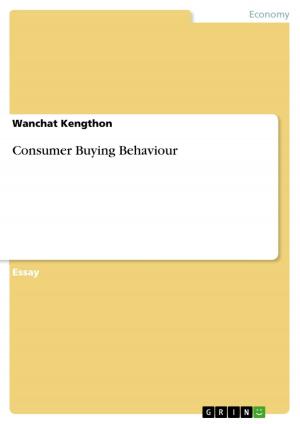Inner and Outer Rejections of a refugee: Anita Desai´s 'Baumgartner´s Bombay`'
Resaons for hesitation, rejection and failure of Hugo Baumgartner in India
Fiction & Literature, Literary Theory & Criticism, British| Author: | Ulrike Löbel | ISBN: | 9783640811632 |
| Publisher: | GRIN Publishing | Publication: | January 26, 2011 |
| Imprint: | GRIN Publishing | Language: | English |
| Author: | Ulrike Löbel |
| ISBN: | 9783640811632 |
| Publisher: | GRIN Publishing |
| Publication: | January 26, 2011 |
| Imprint: | GRIN Publishing |
| Language: | English |
Seminar paper from the year 2010 in the subject English Language and Literature Studies - Literature, grade: 1,7, University of Augsburg (Philologisch Historische Fakultät), course: Refugees in Literature and Film, language: English, abstract: In her novel 'Baumgartner's Bombay' Anita Desai confronts the reader with a protagonist whose life is a chain of happenings not intended, wished for or fought against by him. It seems Hugo Baumgartner is not even aware of the probability that his own willful intervention into the course of his personal history could change matters for him. When he is murdered eventually the reader asks herself if this sudden and drastic end really differs from a natural death since Baumgartner's life without social relations, active engagement in anything he is dedicated to or even a plain economic use for society did not appear to be important or of a unique value for many people. The brutal and cold fact is: Hugo Baumgartner will not be missed The young Hugo Baumgartner is referred to by his first name. His mother and father call him 'Hugo' or give him pet names ('you booby' (25); 'Hugo, Liebling' (29)) and even the heterodiegetic narrator joins in this very familiar, caring and friendly form of address. Later on only Lotte will continue calling him 'Hugo' ('Ach, du lieber Gott, Hugo' (68)) since she is the only one of his acquaintances in life who is present continuously, except for the time he is interned. Furst even calls her 'a grotesque substitute mother' (Furst 171), an interpretation made possible by the end when she is (involuntarily) left by Baumgartner but keeps the letters of his natural mother. The facts that she is also a German and did not succeed in the Indian society create a bond between them although their lifestyles differ drastically. This paper wants to examine possible reasons why he failed to live a fulfilled life after he had escaped the brutal Nazi regime. Major points of interest will be the psychological dysfunctions related to survivor guilt and melancholia, the impact of religion on integration and disintegration and his general problem to develop and administer his own will.
Seminar paper from the year 2010 in the subject English Language and Literature Studies - Literature, grade: 1,7, University of Augsburg (Philologisch Historische Fakultät), course: Refugees in Literature and Film, language: English, abstract: In her novel 'Baumgartner's Bombay' Anita Desai confronts the reader with a protagonist whose life is a chain of happenings not intended, wished for or fought against by him. It seems Hugo Baumgartner is not even aware of the probability that his own willful intervention into the course of his personal history could change matters for him. When he is murdered eventually the reader asks herself if this sudden and drastic end really differs from a natural death since Baumgartner's life without social relations, active engagement in anything he is dedicated to or even a plain economic use for society did not appear to be important or of a unique value for many people. The brutal and cold fact is: Hugo Baumgartner will not be missed The young Hugo Baumgartner is referred to by his first name. His mother and father call him 'Hugo' or give him pet names ('you booby' (25); 'Hugo, Liebling' (29)) and even the heterodiegetic narrator joins in this very familiar, caring and friendly form of address. Later on only Lotte will continue calling him 'Hugo' ('Ach, du lieber Gott, Hugo' (68)) since she is the only one of his acquaintances in life who is present continuously, except for the time he is interned. Furst even calls her 'a grotesque substitute mother' (Furst 171), an interpretation made possible by the end when she is (involuntarily) left by Baumgartner but keeps the letters of his natural mother. The facts that she is also a German and did not succeed in the Indian society create a bond between them although their lifestyles differ drastically. This paper wants to examine possible reasons why he failed to live a fulfilled life after he had escaped the brutal Nazi regime. Major points of interest will be the psychological dysfunctions related to survivor guilt and melancholia, the impact of religion on integration and disintegration and his general problem to develop and administer his own will.















